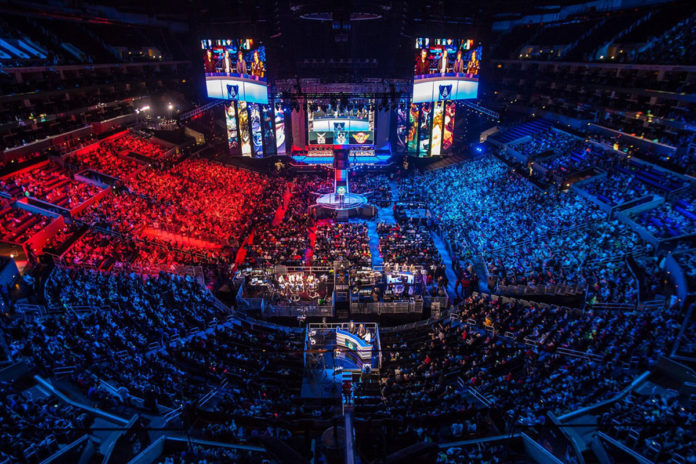Hosting eSport events can help MSAR casinos and hotels diversify their offerings and create the conditions to attract a younger type of customer with disposable income and less interest in traditional types of gambling, gaming experts told Business Daily.
“I think Macau has the best potential for eSports development in all Asia. It doesn’t require visas to come here for Americans, mainland Chinese, everyone can come here. It has all the facilities to host large scale events and plenty of casinos for people to stay in,” Carson Knuth, Business Developer at Unikrn and Co-Founder of Leet.gg told Business Daily.
“It also has a government that is starting to understand eSports and how it relates to gambling. People want to gamble on eSports and Macau can provide that opportunity, with the city providing a jurisdiction where people can come here, eat, drink, watch eSports and just have a good time,” he added.
Mr. Knuth told Business Daily that casinos have the misconception that eSports fans or players are generally not interested in gambling, when they are in fact betting, but on eSports.
“Millennials like to gamble, but they only gamble on things they like. Once you provide them with the tools to gamble, they’ll spend a lot of money,” he added.
The eSport expert quoted statistics stating US$3 million (MOP24.2 million) in legal eSport betting has been reached so far in 2017, with that number expected to increase to US$12.9 billion by 2020.
“In 2016, in one game there was an US$8 million handle that was spent wagering. That’s enormous and it’s a market that wasn’t yet tapped by casinos at all,” he added.
The comments were made at the opening day of Girl Gamer eSports Festival – the first eSports event to be hosted in Macau – held at Melco Resorts and Entertainment’s Studio City property on Friday.
The event also brought to the MSAR several experts in eSports for a business conference focused on how the new sport can contribute to tourism, hospitality and gaming.
“I consider this event also as a Phd course for people who don’t know anything about eSports,” the Chairman of Grow uP eSports, Frederico Santos Rosário, said at the event’s opening.
The event was organised by the local eSport association Grow uP eSports, and was supported by local and international companies such as Companhia de Telecomunicaçōes de Macau (CTM), Alibaba Cloud, and government departments such as the Macau Trade and Investment Promotion Institute (IPIM).
The crowd next door
The CEO of Chinese company eLixir Gaming, Valen Zou, attended the event and described the “exploding” popularity of video games in neighbouring mainland China, with gaming revenues surpassing those in the U.S. last year, reaching RMB167.6 billion (US$25.55 billion), and with the country representing 15 per cent of worldwide gaming revenues.
“In 2017, the number of gamers in mainland China is around 220 million and is expected to grow to 280 million in 2018,” Ms. Zou stated.
This popularity has led to a considerable increase in the attendance at video game competitions and events, with the final of the eSports event King Pro League attracting 13,500 to the arena and an online audience of 3 million viewers.
The growth of the gaming market has also led to several known brands looking to sponsor eSports events, with Alisports – the sports unit of Alibaba Group Holding Ltd – committing last year to a three-year deal to organise the World Electronic Sports Games (WESG).
The event, held in Changzhou, is one of the world’s highest paying eSports tournaments, with a prize pool of US$5.5 million, and is part of a commitment by the Alibaba Group to invest US$150 million into eSports in the coming years.
Catering to the community
One region that is currently trying to harness the eSports effect is Mr. Knuth’s hometown of Las Vegas, as it looks to diversify its entertainment offerings.
“Only 60 per cent of Las Vegas revenue comes from traditional gambling, with the remaining 40 per cent coming from food, shows and nightclubs. Casinos started getting nervous about how to create more entertainment offerings. But how can we promote economic growth if we’re not promoting new ideas?” he questioned.
With most properties in Las Vegas offering the same type of amenities – “excellent casinos, excellent hotel rooms, great nightclubs” – the question is how to differentiate a property from its competitors, points out the expert.
The solution could lie in attempting to target a specific community – in this case the eSports community – with Mr. Knuth mentioning the example of the Downtown Grand Hotel & Casino, which started hosting eSport professional teams to take part in competitions twice a week on their casino floor.
“They saw the opportunity and they took advantage of it […] Players would come to play for money and then trickle down money for food and beverage […] They started understanding what kind of demographic and games attract people who like to gamble and drink more, and started to see extra revenues they weren’t registering before,” he added.
As another example of attracting tourism diversification through eSports, Mr. Knuth mentioned the example of Polish town Katowice, a small industrial town that attracted an attendance of 175,000 people for just one eSports event.
“Now 25 per cent of the Katowice’s annual tourism revenue comes from the Intel Extreme Masters event over two weekends […] With time, a whole separate economy grew around it, with hotels and internet infrastructure being set up, driving revenues to separate industries,” he added.
However, for Mr. Knuth, one of the major issues still lies in how to change the mindset of traditional industry leaders and regional governments to embrace eSports.
“Education is key. There’s a lot of misunderstanding of what eSports is. People think it’s gamers playing video games in their mother’s basement […] However the Nevada governor has made it a priority to make Las Vegas the eSports capital of the world. He said the city should see itself as an entertainment, gaming and eSports capital,” he added.
—
Advantages of eSports events to integrated resorts
-Bringing younger people with disposable income to the properties
-A pivot point to differentiate an operator from its competitors through non-gaming aspects
– A gateway for operators to establish and maintain a long-term relationships with a new type of customer
























